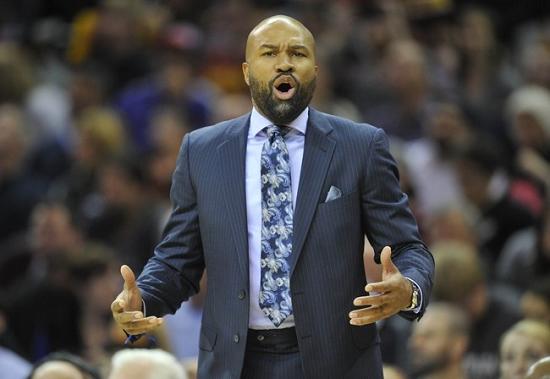NOTE: I am out of pocket more or less until the New Year, so I thought I would re-air a few pieces that I liked from earlier this year for folks who may have missed them the first time. Hope you are having a great holiday season and a Happy New Year!
From February - Goal alignment sounds boring, but it can get you fired, (NBA coaching edition)
My favorite sport is basketball, my favorite league is the NBA, and my favorite team is the New York Knicks.
Yesterday, my beloved Knicks relieved their head coach, Derek Fisher, of his duties about 2/3 of the way through his second season as head coach, with the Knicks currently possessing a 23-31 record, good (or bad) for 12th place in the NBA's Eastern Conference and about 5 games out of the 8th place, and the final playoff spot in the East.
There were various reasons for Knicks' team ownership and management to make the move to release Fisher, but I want to focus on one in particular that has been cited in many of the reports of Fisher's firing. It's a classic HR/Talent Management concept as well - dull sounding goal alignment - the basic, but as we will see overlooked in the Knicks' case, idea that organizational goals should be defined, communicated, and understood throughout and down the organization.  Playoffs? Playoffs?
Playoffs? Playoffs?
The goal in question that at least partially served as a catalyst for Fisher's demise: for the team to finish in the top 8 places in the Eastern Conference and make the NBA playoffs, one season (and a few new players) removed from last year's franchise worst 17- 65 record, and dead last finish in the East.
Here's an excerpt from one report on the firing on how management and Fisher's boss, Knick team President (and NBA coaching legend), Phil Jackson were disapponted in some recent comments from Fisher regarding the Knick's goal of reaching the playoffs this season:
"No. Disappointed in what?" Fisher said in an interview on ESPN radio. "We’re a developing team with a ton of new players. ... We have to be reasonable about who we are and where we are and accept what is and not get caught up in what we should be and allow other people to define what our success is."
Let's unpack that a little, exspecially for folks who don't follow the NBA as much as I do, (everyone).
At the start of the season the Knicks were incorporating several new players, their best player (Carmelo Anthony), was working his way back into form following an injury/surgey last year, and after only 17 wins a yar ago, probably could not have been reasonably expected to compete for a playoff berth this year. Jackson and Fisher, both veterans of the NBA, had to have known this, even if they said different things publicly.
But then a few things broke in the Knicks favor in the first half of the year. Anthony rebounded well from injury and was playing some good basketball, rookie Kristaps Porzingis was MUCH, MUCH better than anyone would have expected, and several new players made contributions to the team. The team was actually in contention for a playoff spot until their recent swoon - losing 9 of their last 10, culminating in the firing of Fisher yesterday.
So the organizational goal at the beginning of the season was probably something along the lines of 'Let's be better than last year, let's develop some new players, and let's figure out which players are not going to cut it.'
About half way in the season, due to some unexpected and better play, at least to Jackson and managment the goal shifted to 'Let's make the playoffs this season.'
But somehow Coach Fisher either didn't get the message, or, didn't buy in to the new goal as one that was reasonable, and one upon which his performance should be evaluated.
Against the first set of goals for the season, even at 23-31, Fisher's performance would have at least been 'acceptable.' The team is better than last year, rookie Porzingis has been a pleasant surprise, and (mostly) Fisher has found a way to be competitive game in and game out.
But against the revised or re-calibrated goal of making the playoffs this season? Well it seems almost certain after losing 9 of 10 that the Knicks are not going to achieve that. Fisher publicly stating that missing that goal 'would not be a disappointment' said to Knicks management that their was a disconnect between what the organization was working towards and what one of its key managers, (Fisher), had in mind. And so Fisher had to go.
It's ok for leaders to change course, set a new goal mid-stream, or ask even more from people who are performing well. But if those folks you are asking to do more and be better are not fully on board? Well then you have pretty different definitions of 'success' in the organization, and that ultimately will drive a wedge between leadership, management, and employees.
Note: I have probably watched 45 or so of the Knicks 54 games this season. I don't think they are a playoff team either.